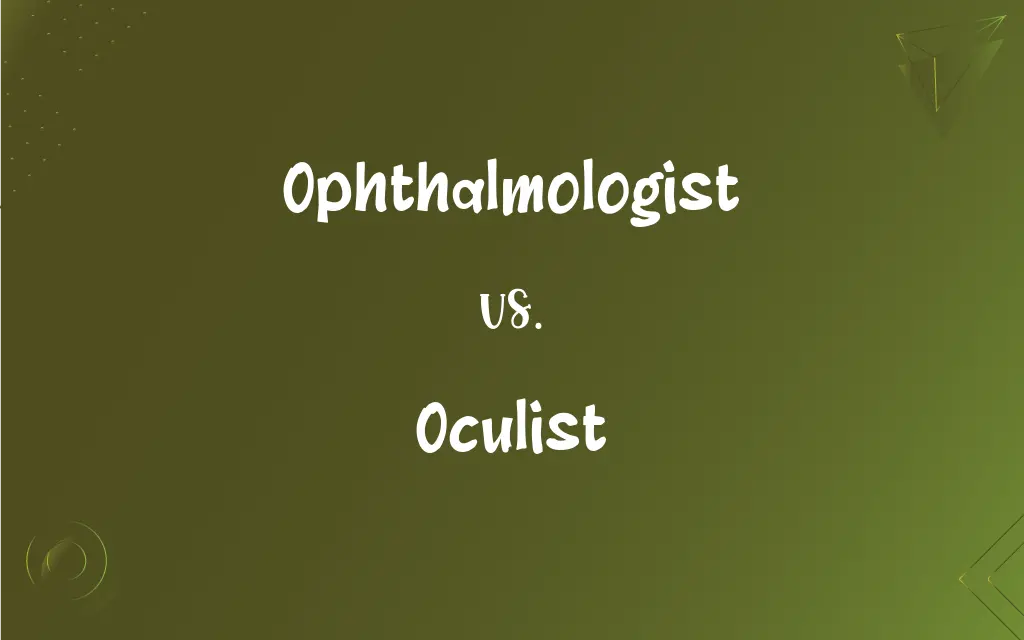Ophthalmologist vs. Oculist: What's the Difference?
By Janet White & Harlon Moss || Updated on May 29, 2024
An ophthalmologist is a medical doctor specializing in eye and vision care, including surgery, while an oculist is an older term that can refer to an ophthalmologist or optometrist, primarily focusing on diagnosing and treating eye conditions.

Key Differences
An ophthalmologist is a medical doctor (MD) or a doctor of osteopathic medicine (DO) who specializes in comprehensive eye and vision care, including performing eye surgeries. They undergo extensive education, including medical school, residency, and often additional fellowship training in eye care subspecialties. On the other hand, an oculist is an antiquated term that historically referred to any eye care professional, including ophthalmologists and optometrists. Today, the term is rarely used, but when it is, it typically implies an ophthalmologist or a general eye care provider.
Ophthalmologists diagnose and treat a wide range of eye conditions, prescribe medications, and perform surgeries such as cataract removal and LASIK. They can also manage complex eye diseases and conditions like glaucoma and macular degeneration. Oculists, as a historical term, encompassed practitioners with various levels of training in eye care, and their scope of practice was less clearly defined.
While ophthalmologists are medical doctors with the ability to perform surgeries, prescribe medications, and offer comprehensive eye care, the term oculist could historically refer to non-medical professionals who may have provided basic eye care services, such as fitting glasses or treating minor eye conditions. The modern equivalent of an oculist, in a broader sense, could include optometrists, who are trained to diagnose and treat eye conditions but do not perform surgeries.
The term ophthalmologist is precise and commonly used in contemporary medical practice, whereas oculist is largely obsolete, replaced by more specific titles like ophthalmologist and optometrist, which clearly define the practitioner's role and level of training.
Comparison Chart
Definition
Medical doctor specializing in eye and vision care
Older term for an eye care professional, often an ophthalmologist or optometrist
ADVERTISEMENT
Education
Medical school, residency, fellowship
Historically varied, could be medical or non-medical training
Scope of Practice
Comprehensive eye care, surgery, medical treatment
Historically varied, modern use typically means comprehensive eye care
Surgical Capability
Performs eye surgeries
Historically might not include surgery, depends on practitioner
Usage
Common and precise
Obsolete and broad, rarely used today
Ophthalmologist and Oculist Definitions
Ophthalmologist
A physician trained to diagnose and treat all eye diseases.
The patient visited the ophthalmologist for glaucoma treatment.
ADVERTISEMENT
Oculist
An old term for an eye care specialist, often an ophthalmologist or optometrist.
In the past, people visited the oculist for eye exams.
Ophthalmologist
A specialist in surgical eye procedures.
The ophthalmologist recommended LASIK for vision correction.
Oculist
Historically, any professional treating eye conditions.
The oculist fitted the patient with new spectacles.
Ophthalmologist
A doctor who prescribes glasses and contact lenses.
After the exam, the ophthalmologist prescribed new glasses.
Oculist
An eye care provider, now a largely obsolete term.
The oculist's practice included basic eye care services.
Ophthalmologist
A medical doctor specializing in eye and vision care.
The ophthalmologist performed a successful cataract surgery.
Oculist
A physician who treats diseases of the eyes; an ophthalmologist.
Ophthalmologist
An expert in managing complex eye conditions.
The ophthalmologist monitored the patient's macular degeneration.
Oculist
An optometrist.
Ophthalmologist
A physician who specializes in ophthalmology.
Oculist
An ophthalmologist
Ophthalmologist
A medical doctor specializing in the eye: deficiencies of vision requiring correction, and diseases. Compare optometrist.
Oculist
An optometrist
Ophthalmologist
One skilled in ophthalmology; an oculist.
Oculist
One skilled in treating diseases of the eye.
Ophthalmologist
A medical doctor specializing in the treatment of diseases of the eye
Oculist
A person skilled in testing for defects of vision in order to prescribe corrective glasses
Oculist
A medical doctor specializing in the treatment of diseases of the eye
Oculist
A practitioner focusing on vision and eye health.
The oculist provided treatments for minor eye ailments.
Oculist
An early term for eye doctors, including various types of eye care practitioners.
Historical records mention oculists treating eye infections.
FAQs
Is the term oculist still used today?
The term oculist is largely obsolete and has been replaced by more specific titles like ophthalmologist and optometrist.
What kind of training does an ophthalmologist have?
Ophthalmologists complete medical school, residency, and often additional fellowship training in eye care.
What is an ophthalmologist?
An ophthalmologist is a medical doctor specializing in eye and vision care, including performing surgeries.
What does the term oculist mean?
Oculist is an older term that referred to any eye care professional, including ophthalmologists and optometrists.
Is the training for an ophthalmologist extensive?
Yes, it includes medical school, a residency in ophthalmology, and often further fellowship training.
Can an ophthalmologist perform surgery?
Yes, ophthalmologists are trained to perform a wide range of eye surgeries.
What procedures can an ophthalmologist perform?
Ophthalmologists can perform procedures like cataract removal, LASIK, and retinal surgeries.
Do oculists perform surgeries?
Historically, the term oculist could include practitioners who did not perform surgery; today, it typically implies a practitioner who may or may not perform surgeries, depending on their training.
Can an oculist prescribe glasses?
Historically, yes, an oculist could prescribe glasses; today, this would typically be done by an optometrist or ophthalmologist.
What is the role of an ophthalmologist in eye health?
Ophthalmologists provide comprehensive eye care, including diagnosis, treatment, and surgery for eye conditions.
Why is the term oculist considered obsolete?
The term is considered obsolete because more specific and accurate terms like ophthalmologist and optometrist are now used to clearly define eye care professionals' roles and training.
What conditions can an ophthalmologist treat?
Ophthalmologists treat a wide range of eye conditions, including cataracts, glaucoma, and macular degeneration.
What is the modern equivalent of an oculist?
The modern equivalent would be an ophthalmologist or optometrist, depending on the level of training and scope of practice.
What did an oculist historically do?
Historically, an oculist treated eye conditions, prescribed glasses, and provided general eye care.
Can an ophthalmologist diagnose eye diseases?
Yes, ophthalmologists are trained to diagnose and treat a wide range of eye diseases.
Did oculists need medical degrees?
Historically, not all oculists had medical degrees; today's ophthalmologists, however, do.
How does an optometrist differ from an oculist?
An optometrist is a trained professional specializing in eye exams and vision care but does not perform surgeries; the term oculist historically encompassed both optometrists and ophthalmologists.
What modern term has replaced oculist?
Modern terms like ophthalmologist and optometrist have replaced oculist to specify different levels of eye care professionals.
Can oculists prescribe medication?
Historically, this varied; today, ophthalmologists can prescribe medications while optometrists have limited prescribing authority.
Are ophthalmologists involved in eye research?
Yes, many ophthalmologists are involved in clinical research to advance treatments for eye diseases.
About Author
Written by
Janet WhiteJanet White has been an esteemed writer and blogger for Difference Wiki. Holding a Master's degree in Science and Medical Journalism from the prestigious Boston University, she has consistently demonstrated her expertise and passion for her field. When she's not immersed in her work, Janet relishes her time exercising, delving into a good book, and cherishing moments with friends and family.
Co-written by
Harlon MossHarlon is a seasoned quality moderator and accomplished content writer for Difference Wiki. An alumnus of the prestigious University of California, he earned his degree in Computer Science. Leveraging his academic background, Harlon brings a meticulous and informed perspective to his work, ensuring content accuracy and excellence.































































